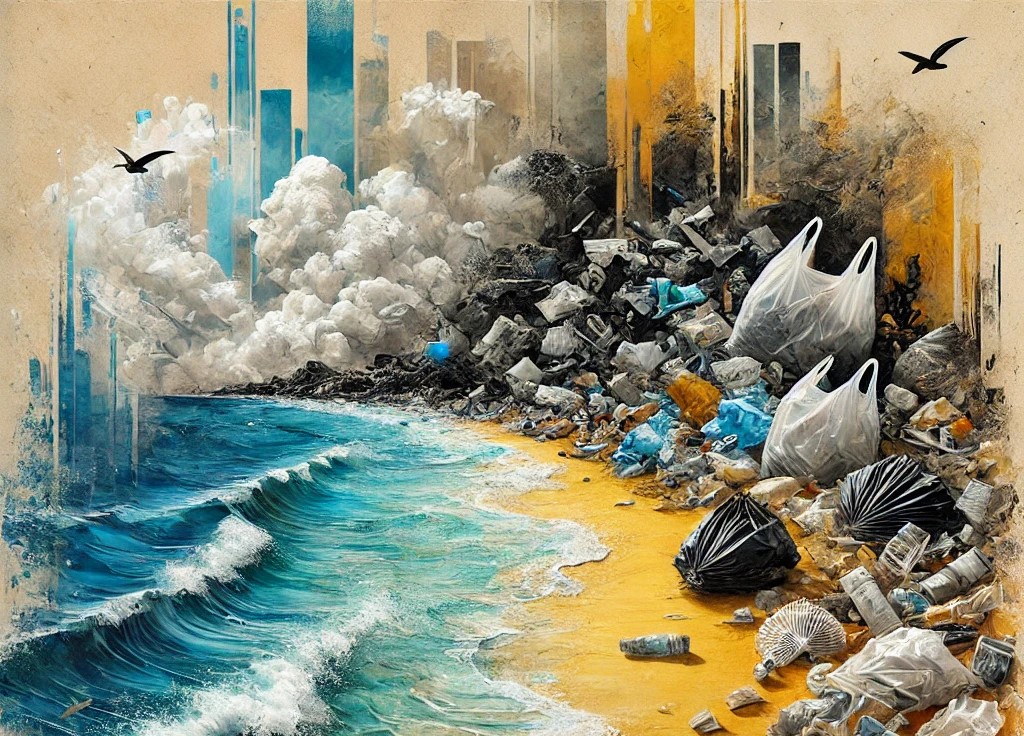Without decisive action, the state’s administration risks compromising its environmental integrity and the very allure that attracts tourists

While Goa has allocated funds toward waste management, the current budget may be insufficient to effectively address the state's high plastic waste generation and to foster a sustainable recycling culture.
Goa, celebrated for its pristine beaches and vibrant tourism, is grappling with a silent yet pressing crisis i.e. the unabated generation of plastic waste.
Despite progressive regulations and government efforts, the inadequacy of recycling infrastructure and budget planning highlights the growing challenge posed by plastic pollution in the state.
Plastic waste has become a significant concern in Goa, with approximately 29,000 tonnes generated annually between 2018 and 2024 (The Goan, 2024).
This equates to around 12 kilograms per capita per year, the highest in India.
Goa’s dual identity as a tourist hotspot and a residential hub has compounded its waste management challenges.
While residents contribute substantially to this waste, the transient population of tourists often amplifies the problem through their consumption patterns, heavily reliant on single-use plastics.
The Goa Waste Management Corporation (GWMC) has been tasked with managing this burden. However, its existing resources and facilities fall short of processing the state’s waste efficiently.
The lack of Plastic Waste Management Units (PWMUs) in village blocks—a critical component under the Swachh Bharat Mission—reflects a gap in execution, despite central government provisions for financial support.
A comparative discussion
The disparity between the plastic waste generation of residents and tourists becomes evident when assessed statistically.
Residents produce approximately 46 grams of plastic waste per person daily, while tourists generate nearly double, at 102 grams per person daily.
This significant difference arises from tourists’ reliance on disposable items such as plastic bottles, straws, and food packaging during short visits.
Tourists, who outnumber Goa’s 15.7 lakh residents substantially — over 8 lakh tourists visited Goa in 2023 and which accounts for nearly 8.5% of Goa's total annual plastic waste generation at the hands of these tourists.
Discussions on waste management frequently highlight the burden tourists place on Goa’s infrastructure.
Unlike residents, who are more integrated into local waste management practices, tourists often lack awareness of segregation systems and rely on the convenience of disposable plastics.
This behaviour exacerbates the strain on Goa’s waste processing capacity, especially during peak tourist seasons.
Addressing this issue requires targeted interventions in the tourism sector, such as incentivising the use of reusable alternatives and strict enforcement of single-use plastic bans in tourist zones.
The constitutional mandate
India’s Constitution provides a robust framework for environmental conservation, which directly relates to managing plastic waste.
Article 48-A of the Directive Principles of State Policy mandates the State to protect and improve the environment, while Article 51-A(g) places a fundamental duty on citizens to safeguard the natural environment.
Additionally, the right to a clean and healthy environment has been judicially interpreted as an extension of the fundamental right to life under Article 21.
The Plastic Waste Management Rules, 2016, further enhance this constitutional mandate by detailing responsibilities for producers, urban local bodies, and consumers.
Extended Producer Responsibility (EPR) obliges manufacturers and brand owners to manage the lifecycle of their plastic products, ensuring environmentally sound disposal.
Despite these regulations, the implementation in Goa has lagged, as evidenced by the absence of decentralised PWMUs and inconsistent enforcement of bans on thin plastic bags and single-use items.
Legislative & practical
shortcomings
The challenges Goa faces are not rooted in the absence of laws but in their inadequate execution.
The Environment Protection Act, 1986, provides the legal foundation for enforcing plastic waste rules.
The Swachh Bharat Mission offers financial incentives to set up PWMUs, yet Goa remains among the few states without such units in its rural blocks.
This delay raises pertinent questions about administrative will and resource allocation, especially when juxtaposed with Goa's high per capita waste generation.
Tourism-driven plastic pollution adds another dimension to Goa’s waste crisis. The hospitality industry, which is heavily reliant on disposable plastic for packaging, beverages, and amenities, contributes disproportionately.
The state’s recycling infrastructure is under-equipped to process this waste, leading to visible environmental degradation in tourist-heavy areas like beaches and markets.
Budgetary allocations
and proposals
In the 2023-24 budget, Rs. 221.15 crore was allocated to the Department of Science, Technology, and Waste Management, which oversees waste mitigation initiatives (Digital Goa, 2024).
While this allocation appears substantial, the distribution across various waste categories and administrative expenses dilutes its impact on plastic waste specifically.
On average, only Rs. 7,625 is available per tonne of plastic waste annually—an amount insufficient to cover collection, segregation, recycling, and public awareness campaigns comprehensively.
To imbibe a sustainable recycling culture in Goa, an enhanced budgetary outlay is essential.
At least Rs. 500 crore annually should be earmarked for plastic waste management.
This allocation could support the establishment of PWMUs in all village blocks, advanced recycling plants, and public-private partnerships to develop innovative waste-to-energy solutions.
Furthermore, tourism revenue, a significant contributor to Goa’s economy, should be partially reinvested into waste management initiatives through ecotourism taxes or levies on single-use plastics.
Goa’s plastic waste crisis represents a clarion call for immediate action. While existing laws and regulations may provide a robust framework, their enforcement remains a critical bottleneck.
By aligning budgetary allocations with the state’s plastic waste realities and leveraging constitutional mandates, Goa would be able to transition toward a sustainable recycling culture.
Consequently, by integrating targeted interventions in the tourism sector, empowering state’s local bodies, and fostering public awareness remain vital steps to mitigate plastic pollution.
Without any decisive action, the state’s administration risks compromising its environmental integrity and the very allure that attracts millions of visitors annually.